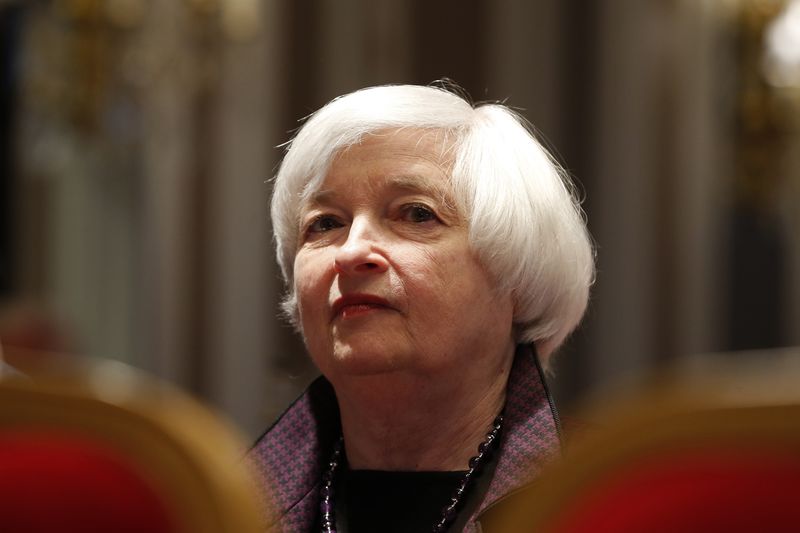(Adds China foreign reserves data)
By Jonathan Cable
LONDON, Feb 7 (Reuters) - Global markets have been in turmoil since the start of the year, with stocks and commodities prices reeling, eroding inflation and making central banks increasingly dovish - a trend that could continue with more weak economic data.
China, a focus of much of the recent market concern, released foreign reserves data on Sunday which showed the central bank dumped dollars to defend the yuan and prevent an increase in capital outflows. country's foreign reserves fell $99.5 billion to $3.23 trillion in January, the lowest level since May 2012, central bank data showed.
U.S. retail sales figures will meanwhile give clues to the state of consumer confidence in the world's largest economy, as will U.S. Federal Reserve Chair Janet Yellen's testimony to the House Financial Services Committee on Wednesday.
Oil prices have tumbled 70 percent since mid-2014, driving down inflation and adding to expectations that central banks will be forced to maintain or even ease further their already ultra-loose monetary policies.
Late last month the Bank of Japan unexpectedly took the plunge into negative interest rates, following in the wake of the European Central Bank, which will more than likely shave another 10 basis points off its own sub-zero deposit rate in March. ECB/INT
For its part, the U.S. Fed is looking increasingly unsure about when it will next raise rates, while economists in Reuters polls have pushed back expectations for the first Bank of England hike by six months in the space of three weeks. BOE/INT
"While we don't think that the world's economy is set to fall off a cliff, the problem is that there is a sizeable output gap, with significant structural excesses in the emerging economies, particularly China, and in commodity-producing countries," said Hiroshi Shiraishi at BNP Paribas (PA:BNPP).
Beijing has been struggling to underpin the yuan as the growth rate in the world's second-largest economy grinds to its slowest levels in a quarter of a century. DOWN FOR FEEBLE EZ GROWTH
Euro zone economic growth was probably a paltry 0.3 percent in the final quarter of 2015, data are likely to show on Feb. 12, matching the third quarter's pace and with inflation nowhere near the ECB's 2 percent target ceiling, expectations are high for more easing.
"The economy in the euro zone is not gathering momentum. For a long time we have been expecting the ECB to loosen its monetary policy again, presumably now in March," said Jorg Kramer at Commerzbank (DE:CBKG).
ECB President Mario Draghi signalled last month further policy easing could be coming within months, leading markets to price in a deposit rate cut in March.
While economists are pretty convinced the ECB will ease again next month they are less sure about how aggressive the U.S. Fed will be after it hiked interest rates for the first time in nearly a decade at the end of last year.
U.S. employment gains slowed more than expected in January as the boost to hiring from unseasonably mild weather faded, yet surging wages and an unemployment rate at an eight-year low suggested the labour market recovery remains firm. mixed numbers make it hard to predict the tone Fed Chair Yellen will adopt at her semi-annual testimony to the House Financial Services Committee on Wednesday.
"This will be one of the more closely watched and scrutinized testimonies in some time as the market tries to gauge whether March is still in play for another Fed rate increase," wrote economists at RBC Capital Markets.
"Given the lack of any real calming in the markets, we think the odds that Yellen heavily promotes a March move are slim."
Financial conditions have tightened considerably in the weeks since the Fed raised interest rates and monetary policy makers will have to take that into consideration should that phenomenon persist, president of the Federal Reserve Bank of New York, said on Wednesday. emerging market growth has exacerbated global concerns and the Reserve Bank of Australia and the Bank of Canada have also highlighted risks, keeping the possibility of policy easing on the agenda.
The Chilean, Peruvian and Philippine central banks all meet in the coming week but no change is expected from them. Sweden's Riksbank may well cut its benchmark rate by 10 basis points to -0.45 percent on Thursday.
"The Riksbank has so much skin in the game that it is unlikely to back off now if it thinks inflation is about to head south again - and low oil prices mean this is very likely," said Colin Bermingham at BNP Paribas. (Editing by Hugh Lawson and Lincoln Feast)
